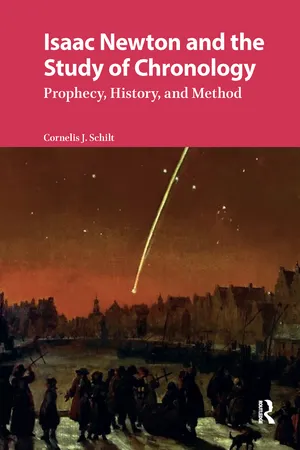
- English
- ePUB (mobile friendly)
- Available on iOS & Android
About this book
Isaac Newton (1642-1727) is best known for his natural philosophical and mathematical works. Yet he devoted ample time to the study of ancient chronology, resulting in the posthumously published The Chronology of Ancient Kingdoms Amended (1728). Here, Newton attempted to show how the antiquity of Greece, Egypt, Assyria, Persia, and other Mediterranean nations could be reinterpreted to fit the timespan allowed for by Scripture. As the hundreds of books from his library and the thousands of manuscript pages devoted to the topic show, the Chronology was long in the making. This volume provides the first comprehensive analysis of the genesis and evolution of Newton's studies of ancient history and demonstrates how these emerged from that other major scholarly project of his, the interpretation of the apocalyptic prophecies in Scripture. A careful study of Newton's reading, note-taking, writing, and ordering practices provides the key to unravelling and reconstructing the chronology of Newton's chronological studies, bringing to light writings hitherto hidden in the archives.
Frequently asked questions
- Essential is ideal for learners and professionals who enjoy exploring a wide range of subjects. Access the Essential Library with 800,000+ trusted titles and best-sellers across business, personal growth, and the humanities. Includes unlimited reading time and Standard Read Aloud voice.
- Complete: Perfect for advanced learners and researchers needing full, unrestricted access. Unlock 1.4M+ books across hundreds of subjects, including academic and specialized titles. The Complete Plan also includes advanced features like Premium Read Aloud and Research Assistant.
Please note we cannot support devices running on iOS 13 and Android 7 or earlier. Learn more about using the app.
Information
Table of contents
- Cover Page
- Half Title Page
- Title Page
- Copyright Page
- Dedication
- Table of Contents
- Illustrations
- Abbreviations
- Acknowledgements
- Conventions
- Introduction
- 1 Past, Present, Future
- 2 Reading Classics
- 3 Chaos and Order
- 4 Sacred Chronology
- Some Concluding Remarks
- Appendices
- Bibliography
- Index